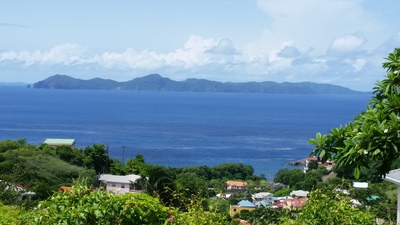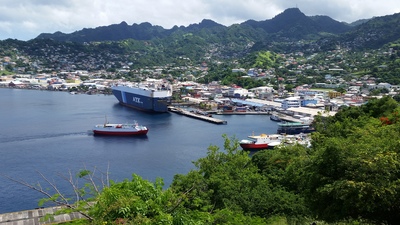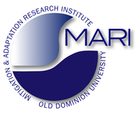Implementing and Monitoring the Sustainable Development Goals in the Caribbean: The Role of the Ocean
Workshop Overview
2030 Agenda and Earth ObservationsMany governments are working on the execution of the United Nation’s 2030 Agenda for Sustainable Development. The implementation and monitoring of the seventeen Sustainable Development Goals (SDGs) of the Agenda pose wicked problems to society. Wicked problems are social or cultural problem that are difficult or impossible to solve because of incomplete or contradictory knowledge, the number of people and opinions involved, the large economic burden associated with progress towards a solution, and the interconnected nature of these problems with other problems. All of this applies to making progress towards the SDGs: Knowledge on how to make progress towards the SDGs is incomplete and contradicting, reaching the SDGs even on a local level involves the whole of society, making progress requires a rethinking of economy (UNRISD, 2016), and the goals are strongly interconnected and there are many interactions between the individual goals that are variable across different economic, social, and cultural settings. For example, poverty (SDG 1) is linked with education (SDG 4), nutrition (SDG 2) with poverty, the economy (SDG 8) with nutrition, and so on. Poverty in California is grossly similar but discretly different from poverty in Angola, and there is no practical set of characteristics that defines poverty. Monitoring progress towards the SDG Targets presents its own challenge: It is hard and maybe impossible to measure success with wicked problems because they impact one another. However, in the case of the SDGs, a crucial input for assessing progress is geospatial data of the both the human and non-human environment. Likewise, the (iterative) development of transformational policies that can facilitate progress towards the SDGs hinges on knowledge derived from data related to the state and trajectory of the Earth system. Responding to this need, one of the three engagement priorities of the Group on Earth Observations (GEO) is the support of the 2030 Agenda. At the core of this engagement priority is the GEO Initiative “Earth Observations in Service of the 2030 Agenda for Sustainable Development” (EO4SDGs). The GEO Initiative “Oceans and Society: Blue Planet” (see also the description in the GEO Work Programme) has a focus on the SDGs, particularly SDG 14. Other GEO Initiatives, Community Activities and Foundational Tasks support the 2030 Agenda in various ways, and they are in need of a better understanding of the observational requirements to serve the 2030 Agenda. Identifying the observation needs for the co-creation of the knowledge for policy development and monitoring of SDGs can build on approaches developed to address wicked problems (e.g., Conklin, 2006; Brown et al., 2010). Within this setting, a transdiciplinary systems approach that considers the data needs of all SDGs provides a basis for compiling those observation needs that are essential for executing the 2030 Agenda. | ||
Implementing the SDGs in Small Island StatesThe governments cannot implement the SDGs without the people, and they cannot implement them for the people; they have to implement them with the people. This necessitates to bring the SDGs to the people in a way that demonstrates the benefits of the 2030 Agenda to the people. The government in Saint Vincent and the Grenadines (SVG) uses a “geospace for SDGs” concept to create ownership for the SDGs in communities. Earth observations, knowledge derived from Earth observations, and other data are fundamental in this effort. Most of the knowledge relevant to SDG implementation in the Small Island Developing States (SIDS) relates in one way or another to the surrounding ocean. | ||
The Ocean and SDGsThe challenges faced by the SIS in the execution of the 2030 Agenda are closely linked with the ocean surrounding these states. In these locations, for almost all of the SDGs, there is a strong interconnection with SDG 14. Moreover, in the SIS, reaching most of the SDGs requires ocean-related policies and actions. Human interactions with the Earth’s life-support system (ELSS) have impacted the physical, chemical, and biological state of the ocean and triggered distinct trends in the ocean system and its functional position in the ELSS. The trends in marine ecosystems, ocean circulation, the global water cycle, and sea level have many impacts on human communities and influence progress towards most of the goals. For SIS, the changing ocean poses a particular challenge. | ||
Workshop Scope and ParticipationThe workshop aimed at a dialogue between the governments and people of the Caribbean Small Island States about their efforts to implement and monitor the SDGs and, by monitoring this dialogue, to extract knowledge needs, which then can be related to data needs. The collaborate effort brought together governments and people of the Caribbean Small Island Developing States, Earth observation providers, scientists, United Nations Agencies active in the region, and regional non-governmental organizations with the goal to link on-going efforts to implement and monitor the SDGs in the Caribbean Small Island Developiong States to required ocean observations and engage in the co-creation of the knowledge needed by those engaged in SDG implementation. The overarching goal was to fully map the requirements for ocean observations serving the implementation and monitoring of the SDGs. Working with, and monitoring the dialogue of those engaged in implement the 2030 Agenda is a novel avenue to better understand what ocean observations are required and what products are available to inform their decisions. In a co-usage effort with the SIS governments, these requirements will be used to match existing data sets and services to the requirements and to engage in a co-creation process for the required knowledge. The workshop was organized in the context of a project supported by NASA that aims to engage with governments to identify knowledge needs and ocean observation requirements related to SDG implementation and monitoring, match these needs and requirements to existing products, identify gaps, and inform relevant GEO components about the findings. It also had the goal to initiate the development of a demonstration pilot for the 2018 GEO Plenary. | ||
Workshop OutcomesThe main outcomes of the project includes a workshop report documenting the deliberations, a white paper detailing the relevance of ocean observations for the implementation and monitoring of SDGs in Caribbean SIS, and a demonstration project for the GEO Plenary in 2018. The Workshop Report summarizes and analyses the deliberations and the outcomes of the workshop. It also includes technical details develop for and during the workshop. It is expected that the workshop led to new collaborations across the boundaries of the societal sectors and between the SIS and international organizations engaged in providing relevant products and knowledge. The workshop report aims to further facilitate and support such collaborations. The white paper is informed by the workshop outcomes. It will provide details on how to ensure support of SDG implementation and monitoring in Caribbean SIS with data and products and how to facilitate the co-usage of the products and the co-creation of knowledge. These outcomes are of central importance to the GEO Blue Planet Initiative and contribute to EO4SDGs. They also are of value to all other GEO components that are engaged in supporting the 2030 Agenda. Funding agencies will be able to make use of the outcomes for the prioritization of resources made available for GEO Work Programme activities in service of the 2030 Agenda. The identified demonstration project will be based on the ``geospace forSDGs'' that has been identified in Saint Vincent and the Grenadines. The project will be developed over the next months and will be featured at the GEO Plenary in 2018 with the goal to illustrate how products and knowledge derived from Earth observations can support SDG implementation and monitoring in the geospace. An additional post-workshop outcome can focus on further exploring synergies among SDGs via evidence-based examples (positive and negative). Developing a feedback tool that will help capacity build is also desirable. Lastly, specific examples of how Earth Observing data can address SDGs at broader extent (i.e., at Goal or Target level), and how it can inform policies would be beneficial. | ||
| ||
Partners
|
ParticipationThe workshop aims to bring together stakeholders representing the governments of the Small Island States (SIS), Earth observation providers, scientists, and private businesses with the goal to support the implementation and monitoring the Sustainable Development Goals (SDGs) in the Caribbean SIS. The main focus is on linking those engaged in implementing and monitoring SDGs to ocean-related knowledge derived from Earth observations and to Earth observation-based products of value for these efforts. The workshop is open to all stakeholders who can contribute to this goal. Those interested in participating in the workshop should indicate their interested by sending an email to info at gstss.org RegistrationTo indicate your interest in participating in the workshop, please complete the Application Form and submit it to info@gstss.org. Onced you have received a response from the organizaers, you will need to pay the registration fee at Eventbrite. The registration fee of $210 covers the costs of meeting rooms as well as coffee breaks and meals. Travel and Subsistence SupportWe have limited funding to support selected participants to cover travel, accommodation, and registration fee. The request for support has to be made when submitting the Application Form to info@gstss.org. AccommodationAccommodation is available at the workshop venue at group rates. The group rates for Garden Deluxe rooms are $125 for single use and $164 for double occupancy including breakfast, service fees and tax. Booking requests can be made on the Beachcombers Hotel Contact page. To get the group rate, use the code "ODU". Bookings will have to be made by December 15, 2017 to ensure group rate and room availability. |
AbstractsThe workshop aims to identify knowledge needs and requirements for ocean observations related to the implementation and monitioring of the SDGs and to match the needs and requirements with existing products. This goal will be achieved in a co-creation of the knowledge needs and observation requirements and a co-usage of the available products. Therefore, the number of presentations will be very limited. However, abstracts for potential presentations or posters can be submitted. A page for abstract submission will be available here in the near future. White Paper ContributionsOne of the outcomes of the workshop and subsequent work will be a White Paper on the ocean observation requirements related to the implementation of the 2030 Agenda. The White Paper is open for community input. A web workspace will be made available here for those who would like to engage in the production of the White Paper as contributors, advisors, or reviewers. |
Logistics
  Left: View to Bequai. Right: Kingstown |
Schedule and Program
Schedule
| ||||||||||||||||||||||||||||||||||||||||||||||||||||||||||||||||||||||||||||||||||||||||||||||||||||||||||||||||||||||||||||||||||||||||||
Program
January 17, 2018
January 18, 2018
January 19, 2018
Other Information |
This workshop was sponsored by:
 under grant 80NSSC17K0241 |
 |
 |
 |
 |